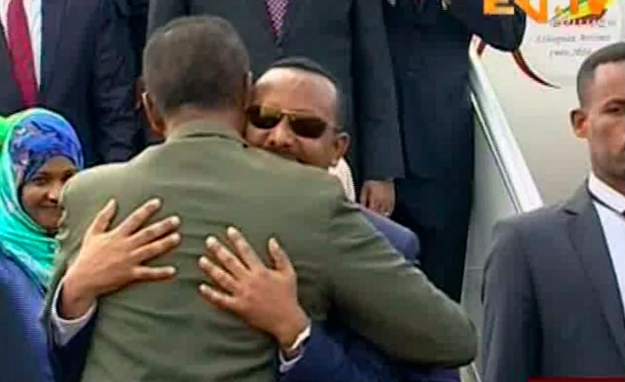Ethiopian Prime Minister Abiy Ahmed traveled Sunday to Eritrea, once a bitter rival, for an unprecedented summit with its longtime leader.
The rapprochement between the two neighbors could have far-reaching consequences for improving the stability of the Horn of Africa, which is home to several conflicts and environmental crises.
Eritrean state television showed an Ethiopian Airlines plane landing at the sparse airport in the Eritrean capital of Asmara, where a brass band greeted Abiy during the first such visit in two decades.
The two Horn of Africa neighbors, sworn enemies for two decades, fought a brutal war from 1998 to 2000 in which at least 70,000 people were killed. In the intervening years, the two sides have clashed repeatedly and supported rival rebel movements.
Abiy was hugged by Eritrean President Isaias Afwerki at the airport, and they smiled and laughed as they strode past the uniformed band and honor guard.
The two men were welcomed by rows of officials and women in traditional dress waving palm fronds, then retired to the airport VIP lounge, where they sat and sipped juice beneath portraits of themselves.
Later, as the convoy of vehicles carrying Abiy passed through downtown Asmara, crowds lined the street and cheered loudly, spilling onto the road and slowing the cars to a crawl.
“Peace is everything, it is health, development, education,” an elderly man wearing a turban and sunglasses told Eritrean state television. “Everyone in the world loves peace.”
The meeting “heralds a new era of peace & cooperation,” Eritrean Information Minister Yemane Meskel tweeted Sunday.
Abiy’s chief of staff, Fitsum Arega, tweeted about the lasting bond between the two peoples as the visit began.
“Our two nations share a history & bond like no other. We can now overcome two decades of mistrust and move in a new direction,” he said.
Later, Fitsum announced that direct telephone connection between the two countries has been restored after 20 years.
The change in relations has stunned observers. For the first time in decades, Ethiopian flags adorned the streets of Asmara and other Eritrean cities in preparation for Abiy’s visit.
Hallelujah Lulie, a political analyst specializing in the Horn of Africa, said the countries had come to the realization that the status quo — no war, no peace — couldn’t continue. As Eritrea’s relations with the West and Arab countries improved, it also became more open to rapprochement. In Ethiopia, the accession of Abiy, who represented a break from the party that once conducted the war with Eritrea, also made it easier to find an end to the stalemate.
Hallelujah added that mediation over the past month from Saudi Arabia and the United Arab Emirates, which have increasingly close ties to Eritrea, probably created the breakthrough.
“It will radically redraw the geopolitical map of the Horn of Africa, and the East Africa,” he said. “The rivalry between Ethiopia and Eritrea was reflected in conflicts in South Sudan, Somalia, even sometimes up to Chad.”
Nearly 30 years ago, the future leaders of the two countries were comrades in the struggle against Ethiopia’s communist dictatorship, when Eritrea was a province of Ethiopia. But after the overthrow of the dictatorship and Eritrea’s declaration of independence, relations soured despite close cultural and linguistic ties.
Abiy, who took office in April, broke the deadlock between the two countries on June 5 by accepting the 2000 peace agreement that ended the war, which would involve ceding territory still held by Ethiopia.
Events moved quickly after that, with Isaias accepting the overtures as a “positive” move and sending a delegation led by his foreign minister to Addis Ababa a week later. There is talk of reopening long-closed air links between the two countries this year.
The summit will probably involve negotiations on how to begin the complex process of returning disputed territory and what happens to the people living there.
Under Abiy, Ethiopia appears to be embarking on a path of reform, but Eritrea has been characterized as one of the most authoritarian and closed states in Africa.
For much of the past 20 years, Eritrea has been focused on its conflict with Ethiopia, with substantial spending on its military and indefinite mandatory military service that has led hundreds of thousands of Eritreans to try to immigrate to Europe.
The end of the conflict could not only open the way for the end of mandatory conscription in Eritrea but also a return to democratic provisions in the constitution that were suspended, including elections.
“There won’t be radical change, but some reforms could be on the horizon,” Hallelujah said.
Increased trade between the two countries is also possible, especially as landlocked Ethiopia could gain increased access to the Red Sea through Eritrea’s ports.





























